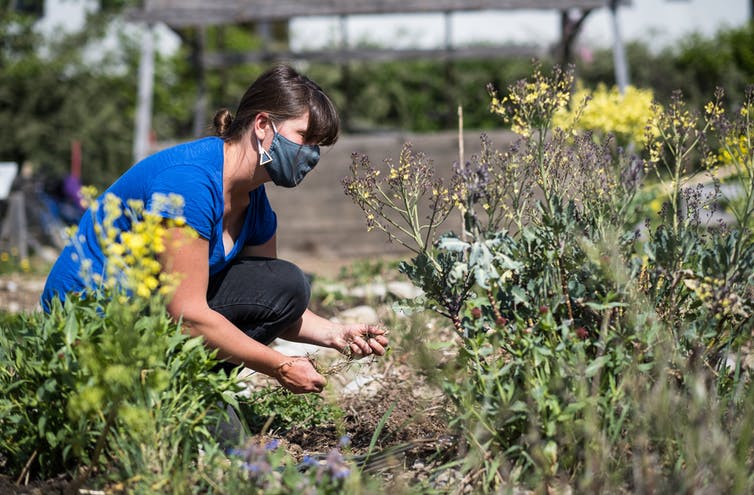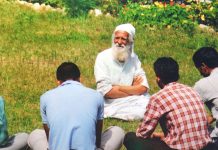
Gardening is a popular hobby in Indian cities. Although in the case of the majority of households there is hardly any space for gardening, the green urge and creativity of many people finds an outlet somehow, even though this may be confined to a few earthen pots. The sheer joy of plucking a few home-grown coriander leaves, or a few mint leaves, a green chilly or two, even an occasional brinjal can cheer up a household any morning.
Basil ( tulsi) plant is of course the most common ( and the most useful) plant for urban households in India. Creepers offer a way of growing useful vegetables and beautiful flowers even in the absence of open space. Terrace gardens open up many creative possibilities. There are other more fortunate households who are able to have a proper garden in front of or adjoining their house.
This instinctive creativity of urban people needs to be tapped in ways so that it becomes something much more than a hobby and can contribute in more meaningful ways to a safer and healthier food system. In the absence of such an understanding, this creativity of people can play only a restrictive role and sometimes this restrictive role becomes even a harmful one. This happens when, lacking a wider perspective, people fall into the trap of using excessive chemical fertilizers, pesticides and other harmful inputs to obtain quick initial growth of plant or obtain a more shining product.
This is harmful for the health of soil, micro-organisms, beautiful and beneficial insects like butterflies and bees, birds , animals as well as human beings. Food obtained in this way is neither healthy nor safe, and the purpose of gardening is really largely defeated if such chemical-intensive methods are used as instead of protecting environment , the cause of environment protection is actually harmed seriously.
Many urban gardeners work by seeking the help of the nearest available ‘maali’ Now of course the traditional maali is a very useful person, very well-informed about plants and with a lot of practical skills. But as is seen in other walks of life, commercialism has crept in and many maalis ( not all) quickly try to make you spend on chemical fertilizers and pesticides. Or else seeds which respond well only when fed by these expensive and harmful inputs may be used.
This is the reason why the admirable and potentially very useful instincts of urban people for gardening are at present not leading to very useful social and ecological impacts and in fact may well be leading to a lot of harm to health and ecology.
Hence clearly there is a need for a campaign to make urban gardening eco-friendly and safer. Such a wide-reaching campaign can help to ensure that the instinctive creativity of millions of urban gardeners leads to very useful beneficial results in terms of protection of ecology and improvement of health. Such a campaign will invariably involve better consciousness regarding the health benefits of organic food which hopefully will reach not just gardeners but other urban people as well, leading to more demand for safe and healthy organic food.
On the other hand, the more people realize the importance of safe and healthy food for their overall well-being the more inclined they will be towards organic gardening within cities. This invariably involves composting of biodegradable waste and once this is accepted as important, the trend towards waste-segregation at source and decentralized composting units within various housing colonies will also get a big boost.
This should not be confined to middle and upper class colonies but should spread to hut-colonies and slums as well where the waste water from kitchens can be used for kitchen-gardens. Various households can also work together . These efforts can be very useful in particular for growing vegetables, contributing much to the nutrition of urban poor households.
A program called Bhoomi Ka has contributed much to these highly desirable objectives and activities in recent times in several cities of India. Supported by WHH ( Welthungerhilfe) this program has included trainings in organic farming, events promoting cooking of organic and healthy food, organization of fairs and festivals of healthy food, educational work on safe food, encouraging inter-action of urban people with organic farmers and related activities. Although the Covid-related limitations diminished some of these activities in more recent times, other ways using informational technology were found for continuing some of the inter-actions and trainings. More such programs, campaigns and trainings are needed. Maalis can also be involved in such trainings so that instead of being lured into becoming sellers of chemical pesticides and fertilizers they can become promoters of eco-friendly gardening and healthy food.
Bharat Dogra is a freelance journalist who has been involved with several social movements and initiatives. His recent book on survival issues and people’s response titled Planet in Peril has been published by Vitasta, Delhi.













